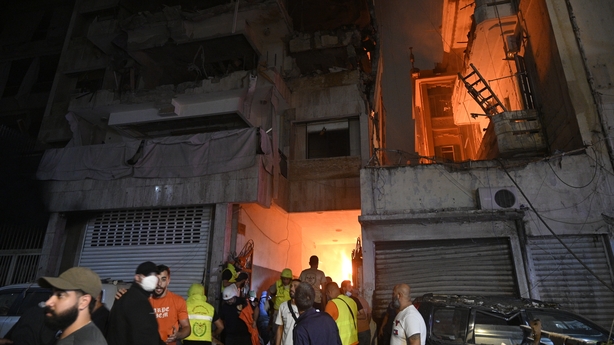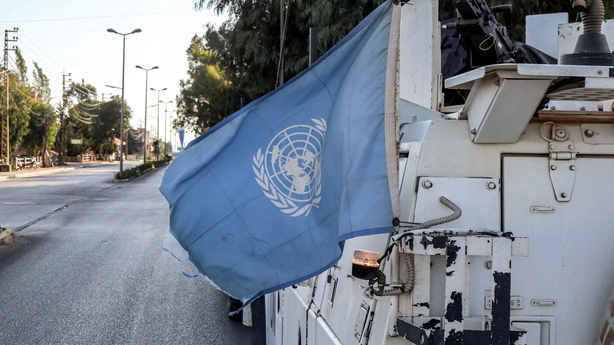Israeli strikes on central Beirut have killed 22 people and wounded at least 117, Lebanon's health ministry said, as a Lebanese security source said at least one senior Hezbollah figure was targeted in the attacks.
Witnesses said at least one strike hit near a gas station.
A large fire blazed in the background as rescue workers used torches to search the rubble for survivors, according to video broadcast by Hezbollah's al-Manar television.
Lebanon's National News Agency said the strikes hit the densely populated neighbourhoods of Nowayri and Basta.
The identity of the Hezbollah target was not clear.
The neighbourhood was not previously hit by Israel and is well removed from Beirut's southern suburbs where Israel has repeatedly targeted.
A thick column of smoke rose above central Beirut after what appeared to be Israel's latest major aerial attack in a widening offensive against Lebanon's Hezbollah group.
There was no immediate comment on the incident by Israel, but its army issued a new evacuation warning for Beirut's southern suburbs including specific buildings.
Earlier in the day, Israel warned Lebanese civilians not to return to homes in the south to avoid harm from fighting.

UN peacekeepers in Lebanon say 'we are staying' despite Israeli attacks
United Nations peacekeepers are determined to remain at their posts in southern Lebanon, the force's spokesperson said, despite Israeli attacks in recent days that have wounded UN personnel and prompted international alarm.
Andrea Tenenti said Israeli attacks on the peacekeeping force known as UNIFIL with tank shells and small arms fire had left two wounded members in hospital and knocked out some of their monitoring capabilities.
"Definitely, this is probably one of the most serious events or incidents that we've been witnessing in the last 12 months," Mr Tenenti said in an interview, referring to exchanges of fire between Israeli troops and the Lebanese armed group Hezbollah.
The force's 50 contributing countries had agreed to keep deploying more than 10,400 peacekeepers between the Litani River in the north and the UN-recognised boundary between Lebanon and Israel known as the Blue Line in the south.
"We are there because the (UN) Security Council has asked us to be there. So we are staying until the situation becomes impossible for us to operate," Mr Tenenti said.
UNIFIL said an Israeli tank fired at a watchtower at the force's main headquarters in Naqoura, hitting the tower and causing two peacekeepers to fall out of it.
Israeli troops also fired at a nearby position, damaging vehicles and a communications system, and yesterday "deliberately fired at and disabled" cameras monitoring the area, the peacekeeping force said in a statement.
Israel said its troops operated near a UNIFIL base in Naqoura but said it instructed the UN forces in the area to remain in protected spaces, then opened fire.
The Defence Forces has said that all Irish personnel serving in Lebanon are safe and accounted for amid ongoing tensions along the Blue Line.
It said that Irish positions "have not faced incoming fire".
We need your consent to load this rte-player contentWe use rte-player to manage extra content that can set cookies on your device and collect data about your activity. Please review their details and accept them to load the content.Manage Preferences

Reuters reported last week that the Israeli military had sent a message asking UN peacekeepers to prepare to move "as soon as possible, in order to maintain your safety".
Israel's UN Ambassador Danny Danon has said that Israel was focused on fighting Hezbollah and recommends "UNIFIL relocate 5km north to avoid danger as fighting intensifies".
He added that "Israel has no desire to be in Lebanon, but it will do what is necessary" to drive Hezbollah away from its northern border so 70,000 displaced residents can return to their homes in northern Israel.
The conflict erupted one year ago when Hezbollah opened fire in support of Palestinian militant group Hamas at the start of the Gaza war.
It has intensified dramatically in recent weeks, with Israel bombing Beirut's southern suburbs, the south and the Bekaa Valley, before sending in ground forces.
The Middle East remains on high alert for further escalation in the region, awaiting Israel's response to an Iranian missile strike on 1 October.

